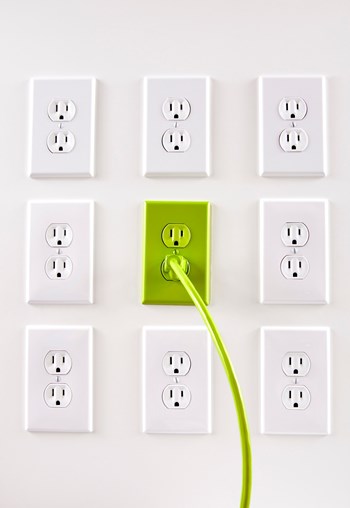
Building owners, managers and even superintendents are always on the lookout for ways to trim their operating budget's bottom line. Electricity and fuel costs continue to climb year after year and identifying cost savings in this area can become more and more difficult. One way to analyze your building's expenses is to conduct an energy audit, but getting one isn't as simple as it seems.
There are different types of audits, services, and ways to save on energy costs. Here's what building owners, managers, and boards should know before getting an audit - and how best to get one.
The first thing for a customer to understand is there are two separate types of energy/utility audits available, both of which have the potential for savings. The first type of audit is what's known as a physical audit, where a property manager or privately-hired consultant will enter the building and check it for energy-efficient lighting or appliances and otherwise scour the property for energy waste. The positive side of a physical audit is the auditors will likely find places where savings can be made.
The drawback in a lot of cases is that a consultant will often make recommendations for more efficient lights and appliances, resulting in a potentially large out-of-pocket cost for the building and its shareholders. For instance, if every hall light bulb is replaced with pricier but more efficient incandescent bulbs, the cost of replacing each can reach into the thousands. The building may become more efficient, but it may take months or even years to recoup the costs of the new products. The costs of buying a new, more efficient HVAC system - though it will save money over time - often scares co-op or condo boards into sticking with the less-efficient equipment already installed.
But the costs involved shouldn't frighten co-op or condo boards that understand the long-term benefits of replacing equipment. According to Maria Vargas, a spokesperson for the Environmental Protection Agency's Energy Star program, all of the more than 40 appliances that already have the Energy Star label pay for themselves in less than five years. "You get to have your cake and eat it too," says Vargas. "Appliances with the Energy Star label allow you to be as comfortable, have the latest technologies, save money on your energy bills, and help the environment."
Vargas adds that the Energy Star website (www.energystar.gov) allows consumers to give themselves a physical self-audit to rate their residential buildings on a scale of one to 10 in terms of efficiency compared to similar buildings. Often, things that can make a building significantly more efficient can be as simple as different light bulbs or programmable thermostats, as both can be a significant cause of energy waste. "I'm surprised by how little people understand the relationship between the light bulb that's in their living room and the power plant," Vargas says.
Another kind of audit is the utility bill audit. These audits can be done by the actual customer, but isn't as likely to be quite as effective as hiring an auditor who specializes in the utility market.
In this case, the auditors/consultants will request a copy of the customer's electric bill, usually one month. The consultants can then go to Con Ed and get two years worth of information on the customer's energy usage for free, and four more years can be purchased - usually at the expense of the consultant - for $15 per account per year.
With six years worth of bills, the auditor or auditors will look for any mistakes or errors and look for billing reduction opportunities. If opportunities are found, they're implemented, and the auditor will also visit the building to look at the meter and make sure it is on the right rate, and that the meter multiplier that is on the meter matches the meter multiplier on the bill. The auditor sometimes removes unnecessary equipment the customer is paying for, determines how the building is heated or cooled, and works to determine if the building qualifies for a better rate.
A credible utility bill auditor has a good relationship with the utility company, and understands their billing, rates, and other factors that will allow them to find the kind of savings most customers may never be able to identify on their own.
New York gradually began to deregulate its electricity market in 1998. The idea was to create a competitive atmosphere to allow customers to choose their utility provider, and at the same time lower prices while improving service. However, the unregulated atmosphere has made utility rates very confusing to the average buyer. Buildings have different classifications, certain credits may or may not apply, depending on the particular heating and cooling system, and a building could be under the wrong tariffs or incorrectly applied taxes, resulting in a higher bill. According to one auditor, 70 percent of all residential utility bills are incorrect to some degree or contain errors of some sort.
Another good reason to audit is unless you specify, the utility company has no reason to give you the very best rate. "When you ask a utility company to turn on the power, they will set you up with a rate, but they aren't responsible for giving you the best rate," says David Matsil, the manager of business development and sales at UtiliSave, a utility bill auditing and cost recovery service in New Rochelle.
Utitlity bill auditors can bill customers in one of two ways: a flat fee or a contingency fee. The flat fee means an out-of-pocket expense is made by the owner of the building at the time of the audit, regardless of whether the audit yields any savings for the customer. The contingency fee is one that a lot of auditors choose to use - and customers often request. The plus side for the customer, says Matsil, is that there isn't an upfront cost for the customer and the fee for the auditor comes from money that's being saved. "The savings amounts to money left on the table," according to Matsil. "Whatever they pay an auditor is from the savings they get. Instead of paying 100 percent of a bill, they pay less and give the auditor some of the difference."
The auditor receives a "cut" of the savings for every bill for a set number of months or years, depending on the contract between the auditor and the customer. Because of the accuracy involved in the audit and determining the new rate versus the old rate, the savings for a customer can be determined down to the penny, so the customer doesn't pay the auditor based on projected savings, but on actual savings.
Michael Lockhart, president of the American Telephone and Utility Consultants in Manhattan, said the contingency fee is a powerful way for customers to get the most savings. "[The auditors] then have a high incentive to find things that can make a bill too high," he says. "We leave no rocks unturned."
When a billing audit is complete, the auditor will usually show the customer the difference between the old rate and the new rate, and makes the request for the new, cheaper rate to the utility company if the customer doesn't object. Once the customer begins saving as a result of the recommendation, billing begins.
During a physical audit, as mentioned above, new appliances are recommended, but they aren't always purchased or put in place when the audit is complete. The one thing all co-op and condo boards should remember when conducting physical or billing audits is there is more at stake than simple savings. One study found the average home emits twice the amount of greenhouse gasses as the average car, and while anything a consumer can do to save money on electric bills is helpful to bottom line savings, the ecological factor can't be forgotten. "When you're looking for inefficiencies, it's not just dollar savings you should look for," affirms Vargas. "It's environmental savings."






4 Comments
Leave a Comment